Text
Midjolandish Vocabulary #13
Swohn n. - Saône
Alternative Forms
Suohn (obsolete)
Swon (Spelling Reform Now!)
Swòn (Citizens for Reformed Orthography)
Etymology
From Middle Midjolandish Suohno [ˈswɔh.nɔ], from Old Midjolandish Suohnã [ˈswɔx.nɑ̃], from Proto-South Germanic *Suogną [ˈsuɔɣ.nɑ̃], from Latin Saoconna
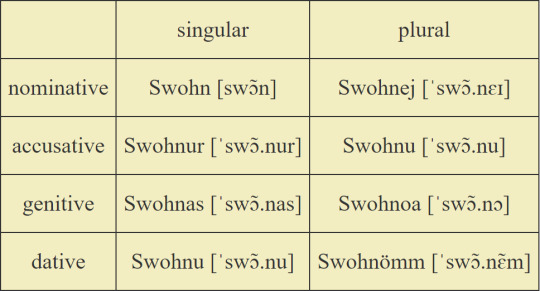
0 notes
Text
Midjolandish Vocabulary #12
Ruðan f. - Rhône
Alternative Forms
Roðan (obsolete)
Etymology
From Middle Midjolandish Roðanæ [ˈro.ðɑ.næ], from Westarish Roðano [ˈro.ðɑ.no], from Latin Rhodanus
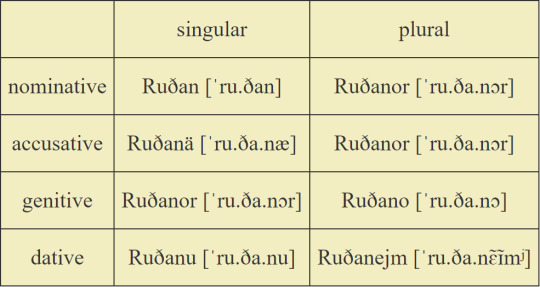
1 note
·
View note
Text
Midjolandish Vocabulary #11
Roin m. - Rhine
Alternative Forms
Rhoin
Royn (Citizens for Reformed Orthography)
Etymology
From Old Midjolandish Rin [riːn], from Proto-South Germanic *Rīnar [ˈriː.nɑr], from Proto-Germanic *Rīnaz [ˈriː.nɑz].
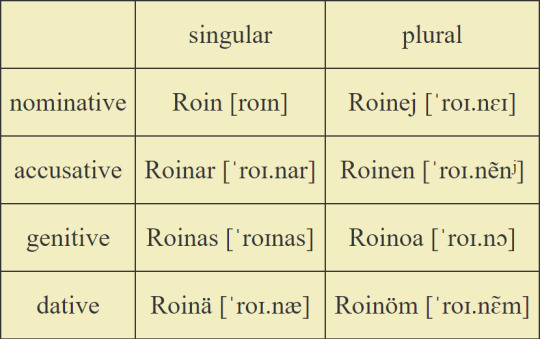
1 note
·
View note
Photo

Kingdom of the Westarish in 585
1 note
·
View note
Text
Midjolandish Vocabulary #10
brejð n. - bread
Alternative Forms
prejð (colloquial)
breið (Spelling Reform Now!)
prèyð (Citizens for Reformed Orthography)
Etymology
From Middle Midjolandish breiðo [ˈbrɛɪ.ðɔ], from Old Midjolandish brauðã [ˈbrau.ðɑ̃], from Westarish broudã [ˈbrou.ðɑ̃], from Proto-South Germanic *brūðą [ˈbruː.ðɑ̃], from Proto-Germanic *braudą.
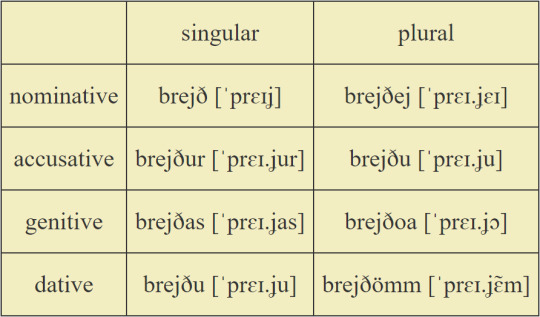
0 notes
Text
Midjolandish Vocabulary #9
eaƀ m. - stranger, foreigner, alien
Alternative Forms
av (Spelling Reform Now!, Citizens for Reformed Orthography)
Etymology
From Old Midjolandish aƀ [ɑːv], from Proto-South Germanic *āvar [ɑː.vɑr], from Proto-Germanic *abô
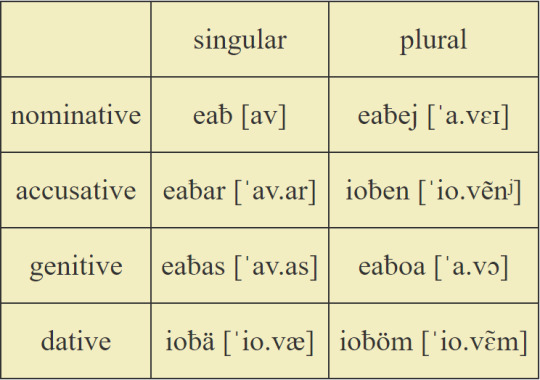
0 notes
Text
Midjolandish Vocabulary #8
lötn n. - lieutenant
Alternative Forms
lètn (Spelling Reform Now!, Citizens for Reformed Orthography)
yètn (Citizens for Reformed Orthography)
Etymology
From Middle Midjolandish ljötno [ˈljøt.nɔ], from Old Midjolandish ljötnã [ˈljøt.nɑ̃], from late Old Romance lieutenant.
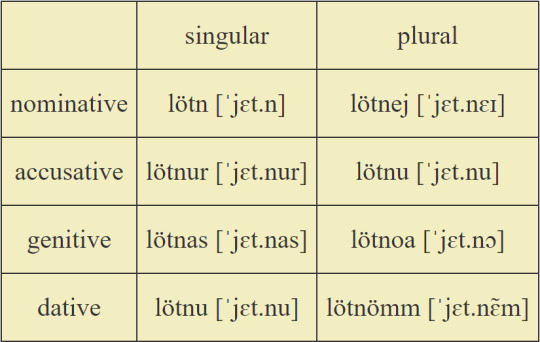
0 notes
Text
Midjolandish Vocabulary #7
ejg n. - eye
Alternative Forms
eig (Spelling Reform Now!)
èyg (Citizens for Reformed Orthography)
Etymology
From Middle Midjolandish eigo [ˈɛɪ.gɔ], from Old Midjolandish augã [ˈau.gɑ̃], from Westarish ougã [ˈou.gɑ̃], from Proto-South Germanic *ūogą [ˈuːɔ.ɣɑ̃], from Proto-Germanic *augô
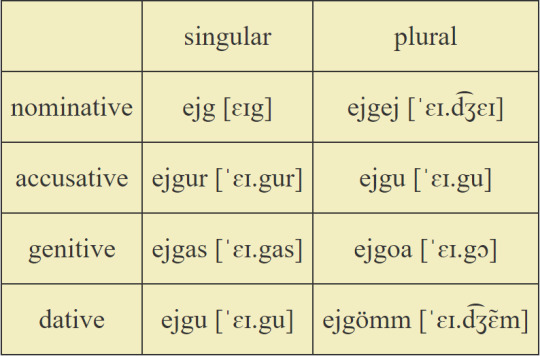
0 notes
Text
Midjolandish Vocabulary #6
fotss m. - foot
Alternative Forms
ƀots (colloquial)
fuots (obsolete)
foz (Spelling Reform Now!)
vòz (Citizens for Reformed Orthography)
Etymology
From Proto-South Germanic *fuots, from Proto-Germanic *fōts
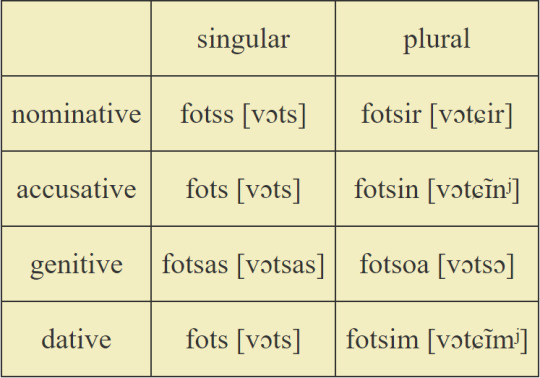
0 notes
Text
Midjolandish Vocabulary #5
mejs f. - mouse
Alternative Forms
meis (Spelling Reform Now!)
mèys (Citizens for Reformed Orthography)
Etymology
From Middle Midjolandish meis [mɛɪs], from Old Midjolandish maus [maus], from Westarish mous [mous], from Proto-Germanic *mūs
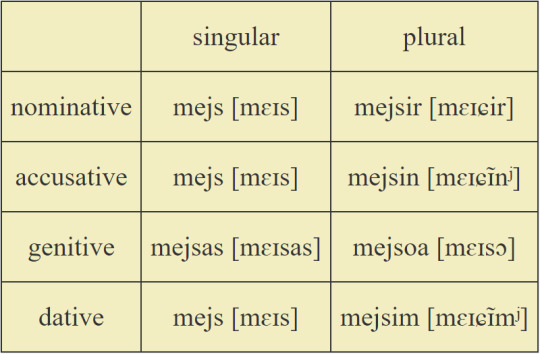
0 notes
Text
Midjolandish Vocabulary #4
jöster n. - tomorrow
Alternative Forms
jèstr (Spelling Reform Now!)
yèster (Citizens for Reformed Orthography)
Etymology
From Middle Midjolandish jöstro [ˈjøs.trɔ], from Old Midjolandish jöstrã [ˈjøs.trɑ̃], from Westarish iestrã [ˈjøs.trɑ̃], from Proto-South Germanic *gestrą [ˈɣes.trɑ̃], from Proto-Germanic *gistrą
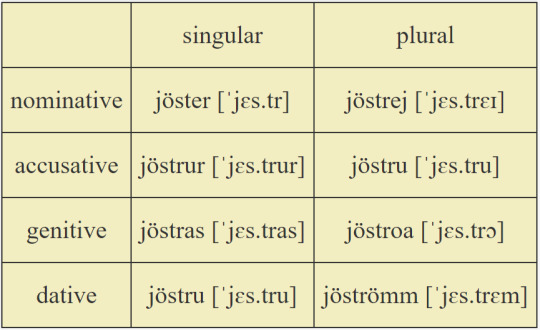
0 notes
Text
Midjolandish Vocabulary #3
fraag f. - question, issue, problem
Alternative Forms
frāg (Spelling Reform Now!)
frág (Citizens for Reformed Orthography)
Etymology
From Old Midjolandish fraigä [ˈfraɪ.gæ], from Westarish freigo [ˈfrei.go], from Proto-South Germanic *frē̈go [ˈɸrɛː.ɣɔ], from Proto-Germanic *fregnaną (to ask).
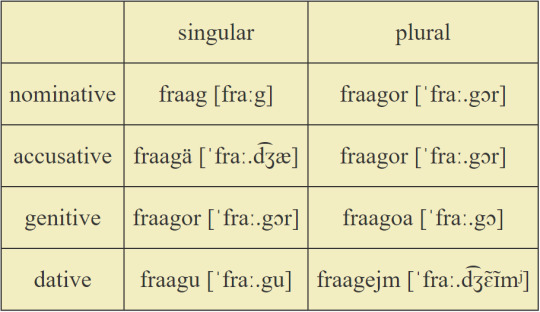
0 notes
Text
Midjolandish Vocabulary #2
pjadesteria f. - infantry
Etymology
From Latin pedester (of infantry, foot soldiers) + -āria
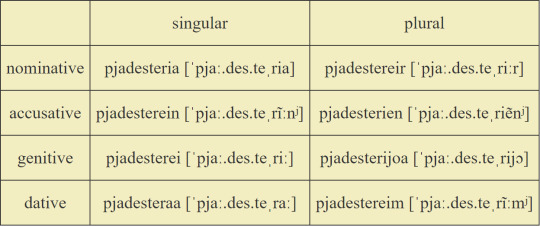
0 notes
Photo

A demonstration of the typical Midjolandish infantry uniform from the early 1900s with early helmet camouflage. The helmet style comes from the medieval sallet type.
The blue upper arm insignia signifies the military unit, in this case the 1st Infantry [Division] or Feirstas Pedesteria [ˈfɛɪr̥.stas ˈpe.des.te.ˌria]
The Gawar-Fojil 1896/15 (Gwr-Fjl96/15) was the main military service rifle from 1916 to the 1930s until it was phased out by the Gwr-Fjl96/34 variant. The Gwr-Fjl96/15 was a straight-pull bolt-action rifle with a five-round magazine that was loaded through stripper clips. The magazine was accessible through a hatch on the right side of the rifle. This hatch was discontinued in the Gwr-Fjl96/34 due to concerns of the hatch allowing dirt into the action of the rifle if not properly closed and in rare cases the locking mechanism breaking allowing the magazine to be open to the elements. The rifle was known for its very smooth action and higher rate of fire compared to most other bolt-action rifles due to the straight-pull bolt. The rifle fired a .34×2.24 (7.56x49.8mm) rimless bottlenecked round.
0 notes
Photo
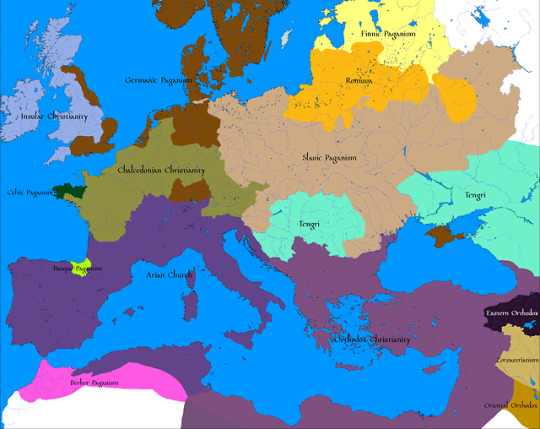
Official Religions in Europe, North Africa, and the Near East in 578.
Important Note: this map does not show the actual religious landscape of the time and at times can be completely different from the ‘official’ religion
0 notes
Photo
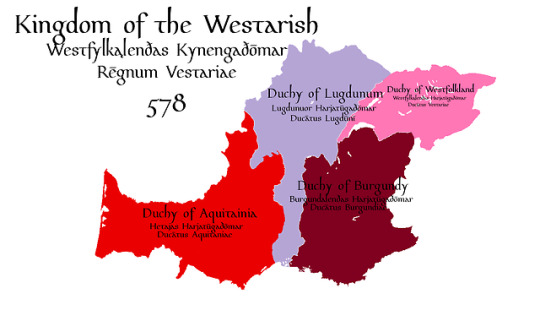
Kingdom of the Westarish in 578, located in OTL southern France and Switzerland including parts of Italy and Germany.
0 notes
Text
Midjolandish Vocabulary #1
fild f. - field, open space, place
Alternative forms
fyld (obsolete, Citizens for Reformed Orthography)
fîld (Reform Spelling Now!)
Etymology
From Old Midjolandish fyldä [ˈfʏl.dæ], from Westarish fyldo [ˈfyl.do], from Proto-South Germanic *fylðo [ˈɸyl.ðɔ], from Proto-Germanic *fuldǭ.
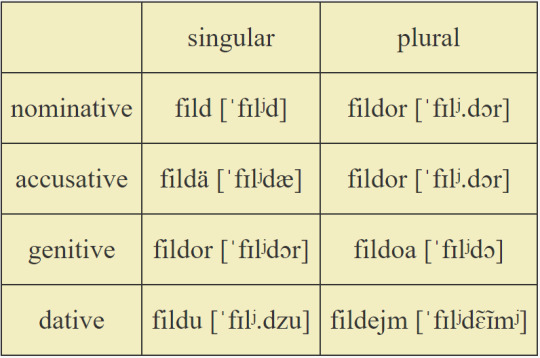
0 notes